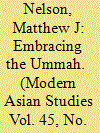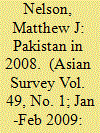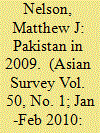| Srl | Item |
| 1 |
ID:
105024


|
|
|
|
|
| Publication |
2011.
|
| Summary/Abstract |
Studies of student politics in Pakistan often focus on the competition between 'secular' and 'religious' student groups-for example, the leftward-leaning National Students Federation, regional parties with a broadly secular orientation like the Pakhtun Students Federation, the Islami Jamiat-e-Tuleba (Islamic Students Association), and sectarian groups like the (Shi'a) Imamia Students Organization. This paper describes the emergence of an increasingly violent stalemate between and amongst these groups since the 1960s. It then argues that for a growing number of students this stalemate produced a certain disenchantment with exclusionary efforts to control the 'state-based Muslim nationalism' that lay behind the formation of Pakistan itself. Seeking alternatives, these disenchanted students developed an interest in non-state-based forms of Muslim solidarity-forms that rejected the constraints of territorial Muslim nationalism in favour of transnational movements focused on the revitalization of Muslim solidarity on a truly global scale-movements like the (Deobandi) Tablighi Jama'at and the (Barelwi) Da'wat-e-Islami. Tracing this development, this paper takes up one application of Talal Asad's argument that alternative expressions of religion (and religious solidarity) are 'produced' by specific political circumstances. It also examines this formulation in the light of other theories that take an interest in the effects-indeed the potentially 'democratizing' effects-of protracted political stalemates.
|
|
|
|
|
|
|
|
|
|
|
|
|
|
|
|
| 2 |
ID:
086674


|
|
|
|
|
| Publication |
2009.
|
| Summary/Abstract |
Following the assassination of Benazir Bhutto in December 2007 and national elections in February 2008, Pakistan struggled to distance itself from the discredited military regime of President (General) Pervez Musharraf. Competition between the Pakistan People's Party (PPP), once led by Benazir Bhutto and subsequently by her widower Asif Ali Zardari, and the Pakistan Muslim League (PML-N) led by Nawaz Sharif, however, threatened to thwart the cause of political stability in Pakistan.
|
|
|
|
|
|
|
|
|
|
|
|
|
|
|
|
| 3 |
ID:
094484


|
|
|
| 4 |
ID:
116657


|
|
|
|
|
| Publication |
2012.
|
| Summary/Abstract |
If US policymakers did not fully understand before 2011 how important the so-called 'Arab street' is in the politics of the Middle East and North Africa, they surely do by now. Whether this principle extends to other parts of the Muslim world is not yet clear, but in Pakistan, one of America's most important Muslim-majority allies, the effect of public opinion on the country's politics, including its foreign policy, may be critical.
Despite an apparent alienation between much of Pakistan's elite and the public at large, many observers are prepared to accept that public opinion drives the behaviour of Pakistan's civilian politicians. But public opinion is also a key driver of choices made by the Pakistan military. Western observers and policymakers tend to assume that senior military officers run the show and have been slow to realise that Pakistani behaviour, even among the upper echelons of the army, is powerfully shaped from below.
|
|
|
|
|
|
|
|
|
|
|
|
|
|
|
|
| 5 |
ID:
077242


|
|
|
|
|
| Publication |
2007.
|
| Summary/Abstract |
Recognising that America's response to the events of 11 September would do well to maintain a sharp distinction between the 'war on terror' and a war 'against Islam', this article argues that American diplomatic rhetoric would benefit from an explicit effort to engage 'frameworks of legitimacy' within Islam, including the terms of Islamic jurisprudence and Islamic legal debate. The article examines the merits of such an approach in the context of several recent diplomatic dilemmas, including the Jyllens-Posten cartoon controversy. It concludes with an assessment of the American (domestic) political environment within which this approach tends to encounter its most ardent critics.
|
|
|
|
|
|
|
|
|
|
|
|
|
|
|
|